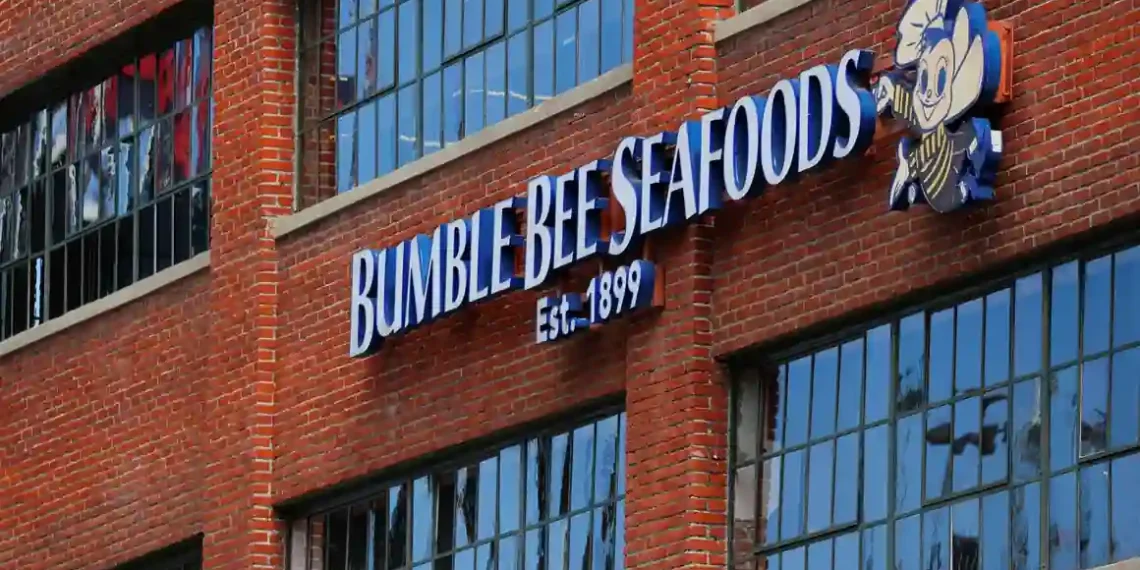Bumble Bee Sued Over Allegations of Forced Labor on Fishing Vessels
A Shocking Allegation of Fishing Boat Slavery
Muhammad Syafi’i recalls the searing pain as hot cooking oil splashed across his stomach, dripping down his legs. His wet clothes clung to his burned skin as it blistered and swelled. The Indonesian fisherman had signed up to work in the fishing industry in 2021, drawn by higher wages abroad. Instead, he found himself trapped in brutal working conditions on a ship supplying fish to Bumble Bee Foods, one of the largest tuna importers in the United States.
Abuse and Neglect at Sea
Syafi’i claims he was physically abused and forced to endure grueling and hazardous conditions. After suffering severe burns while cooking, he says he was denied food, water, and medical care, left to suffer in agony on a bench.
His experience is at the heart of a groundbreaking lawsuit filed by four Indonesian fishermen against Bumble Bee Foods. The suit alleges that the seafood giant knowingly benefited from forced labor, debt bondage, and other forms of exploitation within its supply chain.
A Landmark Lawsuit
The lawsuit, filed on March 12 in a federal court in California, marks the first known case of fishing boat slavery brought against a U.S. seafood company. The four plaintiffs, who worked on three different fishing vessels supplying tuna to Bumble Bee, allege they were physically abused, forced to work against their will, and subjected to inhumane conditions at sea.
“Fishing vessels never really have to go to port, so the men are really, really stuck,” said Agnieszka Fryszman, an attorney representing the plaintiffs. “It makes it very easy to engage in forced labor and trafficking.”
The Hidden Horror of Deep-Sea Fishing
Human rights abuses in the fishing industry are well-documented, but accountability remains rare. The industry’s reliance on migrant workers, complex global supply chains, and operations far from land-based labor laws create a system where exploitation thrives.
“These are people who wanted to work to give their families a better life. Meanwhile, Americans are unknowingly consuming seafood produced through these abuses,” said Sari Heidenrich, a senior human rights advisor at Greenpeace, which is supporting the lawsuit.
Bumble Bee’s Troubled Past
Bumble Bee Foods, a leading name in canned seafood, holds the largest U.S. market share for canned and pouched tuna. However, the company has faced controversy before. In 2019, it filed for bankruptcy following a price-fixing scandal and was acquired by Taiwanese fishing conglomerate FCF Co. for nearly $1 billion.
The lawsuit alleges Bumble Bee violated U.S. human trafficking laws by importing seafood caught using forced labor. The plaintiffs claim they were hired through recruiting firms that withheld large portions of their salaries for “administrative costs,” leaving them in debt bondage with little or no pay. When they protested or attempted to leave, they were threatened with fines and retaliation.
The vessels allegedly stayed at sea for months at a time, relying on transshipment—where supply ships deliver fuel and retrieve the catch—to keep operations running without docking. This practice isolates workers, making escape nearly impossible. Some men attempted strikes, but their captains refused to let them disembark.
Linking the Tuna to Bumble Bee
Fryszman says the legal team was able to connect Bumble Bee’s canned tuna to the abusive ships using the company’s own “Trace My Catch” tool, which allows consumers to track the origins of their fish.
Among the allegations:
- Syafi’i was forced to keep working after his severe burns, despite begging to leave. His captain regularly beat him, and he resorted to wearing a sarong because his injuries made it too painful to wear pants.
- Another plaintiff, Muhammad Sahrudin, alleges his captain hit and lashed crew members, even stabbing them with needles. He says he was beaten so many times he lost count.
- A fisherman named Akhmad claims he was forced to work after a heavy load of fish fell on his leg, cutting through to the bone and filling his boot with blood.
- Another worker, Angga, said food was so scarce that the crew resorted to eating fishing bait to survive.
Forced Labor: A Systemic Problem
Experts say the case is emblematic of a widespread problem in the seafood industry.
“Forced labor is not a one-off issue. It’s not a glitch—it’s a feature of the system,” said Jessica Sparks, an assistant professor at Tufts University specializing in agriculture, food, and environmental issues.
A 2022 International Labour Organization report estimated that at least 128,000 workers were trapped in forced labor aboard fishing vessels, though researchers believe the real number is likely much higher.
“This case highlights how vulnerable workers are recruited, abused, and trapped on fishing vessels registered under countries that fail to take responsibility,” said Natalie Klein, a professor of international law at the University of New South Wales.
Calls for Accountability
For years, NGOs, journalists, and governments—including the U.S. State Department—have pressured seafood companies to take responsibility for their supply chains, particularly regarding labor conditions on fishing vessels.
Bumble Bee claims on its website to be committed to “environmental sustainability and social responsibility,” stating that it “addresses the health and safety of workers throughout our supply chain.” However, the lawsuit argues that the company was aware of abuses and failed to take meaningful action to prevent human trafficking.
The Seafood Stewardship Index, which ranks global seafood companies on sustainability and social responsibility, gave Bumble Bee a score of just 1.27 out of 5, citing a lack of evidence that the company is addressing human rights violations.
Seeking Justice
The fishermen are demanding monetary compensation for their suffering. They are also calling for significant policy changes, including:
- Banning transshipment
- Eliminating recruitment agencies that exploit workers
- Requiring medical equipment on board fishing vessels
- Ensuring ships have WiFi to allow workers to communicate with the outside world
This is not the first time Bumble Bee has faced scrutiny over human rights violations. In 2020, the U.S. halted imports from a Taiwan-based fishing vessel supplying tuna to Bumble Bee due to labor concerns. A 2022 Greenpeace report also linked the company’s tuna to Taiwanese vessels using forced labor.
Last year, Bumble Bee agreed to remove claims of a “fair and safe supply chain” and “fair and responsible working conditions” from its website and advertising following a settlement with Global Labor Justice-International Labor Rights Forum.
Industry-Wide Challenges
Bumble Bee executives have acknowledged the broader issue of labor abuses in the fishing industry. In a 2021 interview with Seafood Source, Leslie Hushka, the company’s senior vice president of global corporate and social responsibility, described worker exploitation as an “industry-wide challenge.”
“There are real challenges in this industry due to its complexity, but we’ve tried to implement systems to improve conditions on our fleets,” Hushka said at the time.
With this landmark lawsuit now in motion, the world will be watching to see whether Bumble Bee and other seafood giants are held accountable for the suffering endured by the workers who bring tuna to American tables.
This article was rewritten by JournosNews.com based on verified reporting from trusted sources. The content has been independently reviewed, fact-checked, and edited for accuracy, neutrality, tone, and global readability in accordance with Google News and AdSense standards.
All opinions, quotes, or statements from contributors, experts, or sourced organizations do not necessarily reflect the views of JournosNews.com. JournosNews.com maintains full editorial independence from any external funders, sponsors, or organizations.
Stay informed with JournosNews.com — your trusted source for verified global reporting and in-depth analysis. Follow us on Google News, BlueSky, and X for real-time updates.














